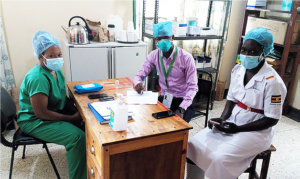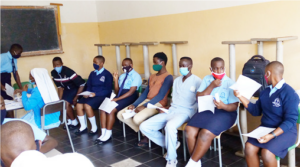 |
Ignatius WadundeBBLT (MUK), MPH (MUK) Host Site: Uganda Cancer Institute (UCI)
|
ABOUT THE FELLOWIgnatius Wadunde holds a Master of Public Health and a Bachelor’s degree in Bio-Medical Laboratory Technology from Makerere University. Before joining the Fellowship program Ignatius worked for the Infectious Diseases Research Collaboration as a Laboratory scientist, Makerere University School of Public Health as a Research supervisor and conducted various field assignments for Ministry of Health, Uganda ranging from immunisation activities to outbreak investigations and response. During His time as a Field epidemiology fellow at the Uganda Public Health Fellowship program, He has been attached at the Uganda Cancer Institute where He gained skills/ experience in community cancer screening and sensitization, leadership and public health response to including data analysis, interpretation and use. The fellowship program has enabled Ignatius to gain technical expertise in field epidemiology skills that include: outbreak detection, investigations and response, evaluation of public health surveillance systems, project development and implementation, leadership and management, capacity building, scientific writing and communication skills. Achievements at the Host SiteWhile at the host site, I was involved in several activities that included
Program specific deliverables Descriptive analysis of surveillance data I conducted a descriptive analysis of COVID-19 surveillance data among truck drivers’ in Uganda in 2020. Overall, 139 cases were registered. All cases were males with age ranging from 22 to 68 years (mean age = 37 years). About three quarters (74%, n=103/139) were asymptomatic. Majority(97%, 135/139) of cases were tested at the points of entry. Above average, (66%, 96/139) ) of the cases reported to have entered Uganda from South Sudan through Elegu POE. We recommended continued testing of truck drivers for COVID-19 at the points of entry before entry to Uganda. Outbreak investigation projects
Fellowship program specific achievements
Epidemiological study
Quality improvement project
Epidemiological bulletins
Newspaper article COVID-19: Which people need to take extra precautions” It was published on the New Vision newspaper. Policy brief
HIV study I conceptualised and implemented an HIV study entitled “Barriers and facilitators to retention in HIV care for persons on community Differentiated Service Delivery (DSD) models in Uganda, 2021”. The facilitators identified included: easy access to medication, less waiting time at facility, good adherence support and reduced transport costs. The barriers identified included: stigma and relocation of clients especially in urban settings. Suggestions by health workers to improve retention in HIV care included: integration with NCD services, sensitisation clients, building community structure and empowering the community pharmacies among others Conference presentations
Manuscripts
 the COVID-19 isolation and treatment unit at Kabale Regional Referral Hospital. Summary of Epidemiological Study:Title: Factors associated with testing positive for COVID-19 among students, teachers and support staff in a secondary school, Kampala, Uganda:November, 2020 Background: Following school closures in Uganda in March 2020 in response to COVID-19, the government re-opened schools to candidate classes on October 15, 2020 with strict COVID-19 guidelines. On October 27, 2020, Secondary School X in Kampala, Uganda reported their first case of COVID-19. By November 17, 2020, 32 confirmed cases were reported in the school. We set out to determine the outbreak extent and factors associated with COVID-19 infection in the school. Methods: We conducted a cross-sectional study employing quantitative methods of data collection. We used an interviewer-administered questionnaire to collect data on socio-demographics and COVID-19 potential risk factors information from all students, teachers, and support staff at the school. Nasopharyngeal samples were taken from the interviewees and tested using RT-PCR to identify SARS-COV-2 infection. We conducted logistic regression to identify factors associated with infection. Results: Of the 361 respondents interviewed: 76% (265/361) were students, 10% (36/361) were support staff, and 4% (15/361) were staff. Thirty one percent (110/361) of the respondents tested positive over the 3-day study period; students had the highest attack rate (32.5%; 101/311)., 90% (328/361) of respondents were asymptomatic at sample collection. The attack rate was 45% (81/180) among those who reported participating in gatherings at school and 45% (74/166) among those who reported spending time in shared areas. Among those who reported attending gatherings, 88% (229/260) mentioned that they attended the Catholic chapel at the school. 78% (188/241) of those who reported exposure to shared areas said it occurred in the dining hall. Being a support staff (AOR: 3.1, 95%CI: 1.2-8.5) and being in Senior Four class (AOR: 1.8, 95%CI: 1.1-3.1) were associated with testing positive for COVID-19. Conclusion:There was widespread of COVID-19 infection at Secondary School X in Kampala during November 2020. Being a support staff or a student of Senior Four class were associated with testing positive for COVID-19. In order to mitigate the spread of the COVID-19 infection, we set up an isolation and treatment center at the school to treat mild and moderate COVID-19 cases.We recommended intensifying daily screening, testing and isolation of symptomatic cases and their contacts, discouraging gatherings, and introducing shifts at the dining halls.  Key lessons learnt during the fellowship
|
|
Sign in
Sign in
Recover your password.
A password will be e-mailed to you.
